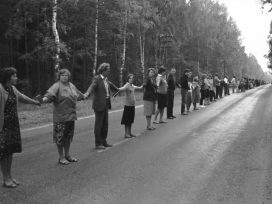The IWM series “Books in perspective” presents publications related to the Institute’s research fields to the local academic community. Authors are invited to discuss their ideas with the audience. On 22 May 2012, Russian literary scholar Alexander Etkind talked about his recent work Internal Colonization. Russia’s Imperial Experience (Polity, 2011). Here, he explains why he wrote this book.
Studying imperial Russia, scholars have produced two stories. One concerns a great country that competes successfully, though unevenly, with other European powers, produces brilliant literature and stages unprecedented social experiments. The other is one of economic backwardness, unbridled violence, misery, illiteracy, despair and collapse. I subscribe to both of these at once. But scholarship is not a dual carriage way, either. We need to find a way to coordinate the different stories that we believe in. My solution is a kind of Eisensteinian montage interwoven with an overarching principle, namely “internal colonization”. I propose this concept as a metaphor that makes the Russian Empire comparable to other colonial empires of the past. In this way, the two Russian stories are turned into one: the story of internal colonization, in which the state colonized its people.
In 1904, the charismatic historian Vasilii Kliuchevsky wrote that Russian history is “the history of a country that colonizes itself”. At that moment, this formula of Russia’s self-colonization had already had a long history in Russian thought. Enriched by twentieth-century colonial and postcolonial experiences, we can draw further conclusions. Russia has been both the subject and the object of colonization and its corollaries, such as orientalism. The state was engaged in the colonization of foreign territories and it was also concerned with colonizing its heartlands. Peoples of the Empire, including the Russians, developed anti-imperial, nationalist ideas in response. These directions of Russia’s colonization, internal and external, sometimes competed and sometimes were indistinguishable.
Exploring the historical experience of the Russian Empire before the revolutionary collapse of 1917, I illuminate its relevance for postcolonial theory. However, I turn the focus onto Russia’s internal problems, which have not previously been discussed in postcolonial terms. Since the 1990s, scholarly interest in the causes and results of the Russian Revolution has paled in comparison to the explosion of research on the Russian Orient, orientalism and Empire.
Led by Edward Said, postcolonial scholars have emphasized the significance of oceans that separated the imperial centres from their distant colonies. In some of these writings, overseas imperialism feels different – more adventurous, consequential, and repressive – in a word, more imperialist, than terrestrial imperialism. However, before the advent of railways and the telegraph, terrestrial space was less passable than the high seas. In times of peace, it was faster and cheaper to transport cargo from Archangel to London by sea than from Archangel to Moscow by land. In times of war, shipments of troops and supplies proved to travel much faster from Gibraltar to Sebastopol than from Moscow to the Crimea. In the early nineteenth century, it was four times more expensive to supply the Russian bases in Alaska by transporting food across Siberia than to carry it by sea around the world. It took two years for Russians to transport fur across Siberia to the Chinese border; American ships did the job in five months. Technically and psychologically, India was closer to London than many areas of the Russian Empire were to St Petersburg. And there were no subjects living on the high seas, no strange, poor people who had to be defeated, tamed, settled and resettled, taxed and conscripted. Two theoretically opposing but, in practice, curving and merging vectors of external and internal colonization competed for limited resources – human, intellectual and financial. The oceans connected, while land divided.
In Lev Tolstoy’s story, “How much land does a man need?”, a peasant goes from “overpopulated” Central Russia to a colonized steppe in Bashkiria, where friendly nomads offer him as much land as he can encircle in a day. He walks and runs from sunrise to sunset and dies of exhaustion when he completes the circle. He is buried on the spot: this, enough for a grave, is how much land man needs, says Tolstoy. But he himself bought one estate after another, subsidizing his agricultural experiments with the royalties from his novels.
Things move fast in the postcolonial world. Just a few decades ago, the idea that Ukraine or even Central Asia were colonies of the Soviet Empire evoked furious resistance on both sides of the Iron Curtain. In the 1990s, postcolonial experts still debated the reasons for not applying their concepts to the emerging countries of the post-Soviet space. The current literature resolves these problems but reveals new ones. Focusing on ethnicity, nationalism and sovereignty in this part of the world, many scholars have turned their backs on the peculiar institutions of the Russian Empire that defined the life of northern Eurasia for several centuries and brought it to its twentieth-century turmoil. Russian serfdom provides a good example. A central subject for nineteenth-century Russian politics and historiography, it is reduced to a footnote in the twenty-first-century textbooks of Russian history. Abolished at the same time as American slavery and involving much greater numbers, serfdom must have had at least as deep and lasting an impact. However, nothing similar to the North American attention to the legacy of slavery has emerged. This double standard in academia is surprising.
Serfdom has become an increasingly unpopular subject in post-Soviet historiography; the contrast between the non-existent Serfdom Studies in Russia and the booming Slavery and African American Studies in the United States could not be stronger. In what remains the best study of serfdom, the American historian Stephen Hoch researched the archive of a large estate near Tambov, a black-soil region of European Russia and a proverbial territory of the Russian interior. In the early nineteenth century, the peasants’ productivity and diet on this estate were equal to or better than what was common in Germany or France. The difference lay in their motivation, property rights, and principles of management. Since neither the land nor a major share of the production belonged to the peasants, they worked under the threat of corporal punishment, which was used routinely. According to Hoch’s data, in about 1826, 79 per cent of males were flogged at least once, and 24 per cent twice a year. For more serious misdemeanours, peasants were also shaved on one side of the head.
Founded in 1636, Tambov was a fortress that protected the Muscovite state from the nomadic tribes that had populated this land before the Russians invaded it. Tambov was thus a contemporary of Williamsburg (1632), an early centre of plantations in Virginia, and of Cape Town in South Africa (1652). Near Tambov, however, the security situation made stable agriculture impossible for 100 years after its foundation, and a plantation-type economy impossible for another 100 years after that. Centrally located, the estate that Hoch studied was still far from the markets; it took a week to deliver grain to the river hub, and to transport it to Moscow took months. Forced resettlements of serfs populated this land, and immigration continued into the nineteenth century. Even then, demographic growth on this estate did not compensate for the draft of recruits and the flights of the serfs. Though the estate was relatively rich, it could not meet imperial demands. It is counterintuitive to consider Tambov as a colony, but anywhere else in the world, land that was populated by forced settlers at a time of high imperialism and, in addition, cultivated under the permanent threat of the lash would be so designated. It so happens that scholars of the Russian peasantry have rarely addressed its particularity from a colonial perspective.
According to classical definitions, colonization (and its ideological system, colonialism) refers to the processes of domination in which settlers migrate from the colonizing group to the colonized land, while imperialism is a form of domination that does not require resettlement. Theoretically, definitions of colonization do not specify whether any particular migration evolved within national borders or beyond them, or whether such borders even existed at the time. In practice, however, and also in intuition, colonization has usually meant travel abroad. Against this backdrop, the concept of internal colonization connotes the culture-specific domination inside national borders, actual or imagined.
But what does it mean exactly, to colonize oneself? Human grammar distinguishes between subject and object, while human history does not necessarily do so. Self-imposed tasks – self-discipline, internal control, colonization of one’s own kind – are inherently paradoxical. Languages, including scholarly ones, get into trouble when they confront these self-referential constructions. In the twenty-first century, scholars of globalization meet the same logical difficulties as scholars of Russian imperial history met in the nineteenth century. Of course, I hope that the world of the future will be no more similar to imperial Russia than it will be to British India. But the experience and experiments of the Russian Empire can still teach us some lessons.
Proponents, victims, and heretics of colonization – internal or external – constitute a multicoloured, paradoxical crowd. Let us look briefly at Immanuel Kant, a subject of the Russian crown from 1758 to 1762. Russian troops took Königsberg after the bloody battles of the Seven Years War, annexed the city, and then unexpectedly retreated. Along with all city officials, professor Kant took an oath to the Russian Empress. Kant was then in his “gallant phase,” worldly, fashionably dressed and in demand, if not at balls, then at dinner parties. In his writings and lectures from this and slightly later periods, there are signs of his discontent with philosophy and intellectual life, a midlife crisis of a sort. Historian Anthony La Vopa discerns “an element of self-caricature, and indeed of self-hatred” in Kant’s lectures during the occupation and his writings that followed the withdrawal of Russian troops. Among the explanations for this important though temporary crisis, one comes from the postcolonial tradition. Under a colonial regime, the local intellectuals often registered similar feelings of internal splitting, doubling and self-hatred. Much of twentieth-century existential thought came out of these situations, in Algeria and elsewhere. Reinstating Kant in occupied Königsberg helps us understand his relation to this tradition. For those who believed in self-reliance and an inner light, it was difficult to live under foreign rule. Whether the reason was anxiety or trauma, the fact is that the occupation created a writing block in Kant. Immediately after the abrupt end of the occupation, in 1762-3, Kant’s publications burst forth. Relying on the writings of a Russian officer, Andrei Bolotov, who worked in the headquarters of the occupying army and took private lessons of philosophy with one of Kant’s rivals, I have reconstructed the uneasy relations between the colonizers and the colonized in the city of Kant. He did not leave this city, not even once, but history entered it in all its brutality, and the experience of living as a subaltern, under Russian occupation, influenced Kant’s later thinking.
Employed by Bismarck, Lenin, and Hitler, mentioned by Weber, Foucault, and Habermas (and, with slightly different wording, developed by nineteenth-century Russian historians), the concept of internal colonization has a deeper genealogy than is usually assumed. To be sure, extending the postcolonial edifice, which has never been very coherent, to the immense space of the Russian Empire, requires not just an “application” of pre-existing ideas, but their deep refashioning. Doing so might help us to understand not only the Russian imperial experience, but also, the unused potentialities of postcolonial theory.
Published 25 June 2013
Original in English
First published by IWMpost 110 (2012)
Contributed by Transit © Alexander Etkind / IWMpost / Eurozine
PDF/PRINTPublished in
In collaboration with
In focal points
Newsletter
Subscribe to know what’s worth thinking about.
Related Articles

The ‘Trump–Putin deal’ again places Ukrainians in a subaltern role. The leaked contract with its fantasy $500 billion ‘payback’ has been compared to Versailles, but the US betrayal recalls nothing so much as Molotov–Ribbentrop.

Ukraine faces its greatest diplomatic challenge yet, as the Trump administration succumbs to disinformation and blames them for the Russian aggression. How can they navigate the storm?







